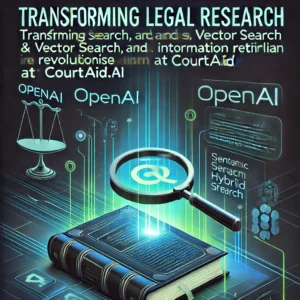In the ever-expanding digital landscape, the quest for efficient information retrieval has led to groundbreaking innovations. Among these, OpenAI and vector search stand out as transformative technologies, redefining how we access and make sense of vast amounts of data. Adding another layer of sophistication to this landscape is CourtAid.ai, which employs Semantic Hybrid Search, a powerful combination of OpenAI models and vector search, setting a new standard for accuracy and specificity in legal information retrieval. In this article, we explore the strengths and advantages of OpenAI, vector search, and Semantic Hybrid Search compared to traditional text search engines.
The Evolution of Information Retrieval
Traditional text search engines have long been the backbone of information retrieval on the internet. These engines rely on keyword-based algorithms, matching user queries with indexed text to deliver relevant results. While effective to a certain extent, this approach often falls short when confronted with nuanced queries, context-dependent searches, or the need for semantic understanding.
OpenAI, a pioneer in artificial intelligence, takes information retrieval to new heights with its advanced language models. Unlike traditional search engines, OpenAI models, such as GPT-3.5, have the ability to comprehend context, generate human-like responses, and adapt to the intricacies of natural language. This makes them particularly adept at understanding user intent and providing more accurate and contextually relevant information.
The Power of Vector Search
Vector search, another innovative paradigm in information retrieval, leverages the principles of machine learning to represent documents and queries as vectors in a high-dimensional space. This approach allows for a more nuanced understanding of the relationships between words, phrases, and documents, enabling a semantic search experience.
Traditional text search engines struggle with semantic understanding, often returning results based on keyword matches rather than the underlying meaning of the query. Vector search, on the other hand, excels at capturing the semantic nuances of language, facilitating more accurate and contextually rich results.
Semantic Hybrid Search and CourtAid.ai
CourtAid.ai introduces Semantic Hybrid Search, a cutting-edge approach that combines the contextual understanding of OpenAI models with the semantic precision of vector search. This fusion allows CourtAid.ai to provide users with the most accurate and relevant legal information available.
1. Contextual Relevance
By leveraging OpenAI’s language models, CourtAid.ai achieves a level of contextual relevance that goes beyond traditional keyword-based searches. The models analyze the context surrounding legal queries, ensuring that the responses are not only technically accurate but also aligned with the implicit meaning and context behind the user’s request.
2. Semantic Precision
Vector search, known for its ability to capture semantic relationships, enhances the precision of CourtAid.ai’s search capabilities. The synergy between OpenAI models and vector search ensures that legal information retrieved is not only contextually relevant but also semantically accurate, offering users a deeper understanding of the legal landscape.
3. Natural Language Interaction
OpenAI’s language models, when integrated into the Semantic Hybrid Search of CourtAid.ai, facilitate a more natural and conversational interaction with the legal information retrieval system. Users can engage with the platform in a way that mirrors human conversation, making the process of accessing legal insights more user-friendly and intuitive.
The Future of Information Retrieval
As technology continues to evolve, the integration of OpenAI, vector search, and Semantic Hybrid Search promises a future where legal information retrieval is not only efficient but also deeply aligned with human understanding. Traditional text search engines, while still relevant, are increasingly being complemented or replaced by these innovative approaches, ushering in a new era of intelligent and context-aware legal information retrieval. CourtAid.ai’s commitment to Semantic Hybrid Search further underscores its dedication to providing the best and most reliable legal information to its customers.
